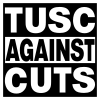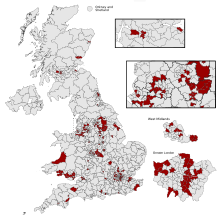Trade Unionist and Socialist Coalition
This article's subject is participating in the 2024 general election to the UK's House of Commons on 4 July, and has had no MPs in the House of Commons since Parliament's dissolution on 30 May. The article may be out of date during this period. |
Trade Unionist and Socialist Coalition (TUSC) is a socialist electoral alliance in Britain. It was originally launched for the 2010 general election.[7][8][9]
Trade Unionist and Socialist Coalition | |
|---|---|
 TUSC logo | |
| Abbreviation | TUSC |
| Leader | Dave Nellist[1] |
| Founded | 2010 |
| Headquarters | 17 Colebert House Colbert Avenue London E1 4JP[2] |
| Ideology | |
| Political position | Left-wing[4][5] to far-left[6] |
| Colours | Pink, brown and red |
| Members | |
| Election symbol | |
 | |
| Website | |
| www | |
TUSC's co-founder was the RMT union general secretary Bob Crow. Members of the PCS, Unison, NEU, UCU, Napo and POA unions are on the steering committee. The biggest component section of TUSC was the RMT[10] until they disaffiliated at the 2022 RMT AGM.[11] The most prominent participating political groups are the Socialist Party and the Resistance Movement.[10] TUSC stood 135 (parliamentary) candidates across England, Wales and Scotland at the 2015 general election[12] and 619 the same day in local government elections.[13]
Following the election of Jeremy Corbyn as leader of the Labour Party, TUSC did not stand candidates in the 2017 UK general election and suspended electoral activity in November 2018.[14] It did not contest the 2019 general elections, stating: "TUSC recalibrated its electoral activity following Jeremy Corbyn’s election as Labour leader, a development which it warmly welcomed.".[15] In July 2020, after Jeremy Corbyn stood down, the Socialist Party called for the relaunch of the alliance;[16] in September of the same year, the TUSC steering committee agreed to resume standing candidates in the 2021 UK local elections.[10] It stood further candidates in the 2022 UK local elections,[17] and 40 candidates at the 2024 United Kingdom general election.[18]
History
editFoundation
editAt the March 2009 Socialist Party congress, RMT executive members Alex Gordon and Brian Denny addressed Socialist Party delegates in an official capacity, outlining the RMT's proposal for workers' slates in the European elections in June. At a later congress session this initiative was formally agreed by congress delegates, and No to EU – Yes to Democracy (NO2EU) was formed.[19] NO2EU, an electoral alliance, headed by Bob Crow, between the RMT, the Communist Party of Britain and the Socialist Party, subsequently led to the formation of the Trade Unionist and Socialist Coalition. The Socialist Party, which had previously participated in the Socialist Alliance and Welsh Socialist Alliance and backed the Campaign for a New Workers' Party, termed No2EU "an important first step towards independent working class political representation", despite criticisms of the name and other minor issues.[20] The Socialist Party stated it "would prefer a name that includes 'socialism', for marked ideological contrast to New Labour, and also one that makes it clear that the coalition is a working class alternative."[20] Nevertheless, the Socialist Party noted the success of Die Linke in Germany, the New Anticapitalist Party in France and Coalition of the Radical Left in Greece, and emphasized the need for a "genuine socialist alternative" in the European elections.[21][22][23]
After the European elections, in July 2009, the CPB released a statement[24] expressing willingness to continue the No2EU programme and support left-wing alliance candidates in some constituencies, but also called for a vote for Labour Party candidates in others. However, on 17 January 2010 the executive committee of the Communist Party declined to formally participate in the coalition.[25]
Negotiations to found the coalition continued over several months after the EU election. One proposed name for the coalition was "Trade Unionists and Green Socialists Alliance".[26] The RMT, which had formally supported No2EU, initially decided, in January 2010, not to similarly back TUSC, but allowed individual branches to support it.[27] It later gave TUSC candidates its full backing (see below). On 12 January 2010, the coalition was announced[28] and subsequently, the RMT National Council of Executives supported 20 TUSC candidates on receipt of local RMT branch requests.[29] TUSC chairperson Dave Nellist stood as a candidate for the coalition in the constituency of Coventry North East. Among the other candidates were Jackie Grunsell in Colne Valley constituency, Keith Gibson in Hull West and Hessle, Dave Hill in Brighton Kemptown, Ian Page in Lewisham Deptford, Rob Williams in Swansea West and Tim Cutter in Southampton Itchen.
Some political groups such as the Alliance for Workers Liberty and the Weekly Worker newspaper have argued that the coalition was formed in secret and without democratic input.[30]
Meanwhile, just after the 2009 European Elections, the Socialist Workers Party, which had not taken part in No2EU but which had itself been part of the Socialist Alliance and the Respect Party, published its "Open Letter to the Left",[31] in which it called for "a united fightback to save jobs and services" and subsequently joined TUSC; it left TUSC (England and wales) in 2017, but remained part of the autonomous Scottish TUSC for a time,[32] before leaving entirely.[33]
In July 2020, the Socialist Party called for the relaunch of the electoral alliance[16] and in September the TUSC steering committee agreed to resume standing candidates in the 2021 UK local elections.[10]
People's Alliance of the Left
editOn 20 January 2022, it was announced that a "memorandum of understanding" had been agreed between TUSC, the Breakthrough Party, the Northern Independence Party and Left Unity. This alliance, known as the People's Alliance of the Left (PAL) would see the four parties work together on a future electoral strategy.[34] It did not last long, however, as TUSC was removed from PAL after its Steering Committee agreed "observer status" for the Workers Party of Britain, led by George Galloway.[35] In a statement, the NIP said that degrading statements made both by Galloway and other Workers Party members about women, non-binary people and immigration had made it impossible for TUSC to remain part of PAL.[36]
Towards the end of July 2023, a left-wing political party merger between Breakthrough, Left Unity, People's Alliance of the Left and Liverpool Community Independents under the name "Transform" was proposed.[37][38] It was proposed in response to "an era of crisis" which the party merger proposal claims to be "a political organisation that offers a real solution" to. The party merger proposal also has 10 "core principles". If put forward, 5 left-wing parties will be merged, although it is not known for sure whether TUSC is considered to be a part of this merger.
Trade union interaction
editTrade union endorsement
editThree Annual General Meetings (2012, 2013 and 2014) of the National Union of Rail, Maritime and Transport Workers (RMT) under the leadership of Bob Crow, endorsed RMT support for TUSC candidates and the RMT was formally represented on the TUSC steering committee.
TUSC claimed in September 2020 that the RMT executive urged TUSC to resume electoral activity after Jeremy Corbyn stepped down as Labour Party leader. TUSC stated: 'Representatives from the biggest component organisation of TUSC, the RMT transport workers’ union, reported to the [TUSC national steering committee] meeting on September 2, that the union’s national executive committee had debated the matter over the summer. They had agreed that, “in the new conditions of a Starmer leadership and the continued implementation of austerity cuts by many Labour-led authorities, we believe it is correct for TUSC to lift its suspension of electoral activity”. And that is what the steering committee agreed.'[39]
After the relaunch of TUSC, the November 11, 2021 steering committee meeting was attended, in a personal capacity, by members of the executives of five different unions: the public sector union, UNISON; the National Education Union (NEU); the PCS civil servants' union; the University and College Union (UCU); and the family court and probation workers' union NAPO. The RMT was absent.[40]
Unite the Union and TUSC
editIn 2022, under newly elected General Secretary Sharon Graham, Unite responded to TUSC's invitation and formally deputised the union’s Lead for Local Government, Onay Kasab, to TUSC's annual conference on Sunday February 6 to 'explain the extremely significant decision of [Unite's] recent policy conference to call on “Labour councils to set legal, balanced no cuts needs based budgets” rather than meekly accept the Tories’ austerity agenda', which echoed a policy position of TUSC.[41][42]
Previously, in February 2015, senior figures from Unite the Union condemned the Socialist Party and by implication TUSC, for standing candidates against Labour in marginal constituencies for the 2015 general election. The open letter addressed to the Socialist Party, which does not mention TUSC, accuses the Socialist Party of having a "derisory" electoral record.[43] In response, the Socialist Party claimed that a Labour government "would be at best austerity-lite and a continuation of the crisis that faces working class people".[44]
Organisation
editTUSC is an umbrella organisation with a federal structure.[45] It has been registered as a political party with the Electoral Commission since 2010. All candidates supporting the coalition must support a core policy platform, but beyond this each candidate is free to campaign on the platform of their own political party.[27]
All-Britain Steering Committee
editEach of TUSC's constituent organisations is entitled to have representatives on the All-Britain Steering Committee, where they engage in decision-making regarding policy, strategy, and the selection of candidates. Until 2022, these organisations included, most notably, the RMT, the Socialist Party, the Socialist Party Scotland (Scottish TUSC), and the Resistance Movement.[45]
National and local steering committees
editTUSC participants in Scotland are nationally organised with an autonomous Scottish TUSC Steering Committee. Additionally, local branches of TUSC each have their own steering committees established for local government areas and parliamentary constituencies where TUSC contests seats.[45]
Current and past participating organisations
editThe following organisations have been involved in TUSC at various times:
- Trade unions
- the National Union of Rail, Maritime and Transport Workers (RMT) (left in 2022)
- Other organisations
- DayMer[46]
- Hull Red Labour[47]
- the Labour Representation Committee[48]
- Left Unity[48]
- Leicester Independent Councillors Against the Cuts[47]
- the Pan-African Congress[48]
- the Resist Movement[49] (now a part of Workers Party of Britain)
- the Respect Party[48] (defunct)
- the Socialist Resistance[48]
- the Socialist Party (England and Wales)
- the Socialist Party Scotland
- the Socialist Workers Party[33] (left in 2017)[50]
- Southampton Councillors Against Cuts[51]
- the United Socialist Party[48]
Policies
editUnder the title "TUSC backs the 'Rochdale insurgency against establishment politicians", published two weeks prior to the landslide victory of George Galloway[52] in the Rochdale by-election of 1 March 2024, TUSC posted a press release announcing: "An insurgency against the capitalist establishment and their tame politicians is brewing in Rochdale, and not just there. It’s obvious which side trade unionists and socialists should be on”.[53]
The press release further added: "The Workers Party of Britain, on whose ticket George Galloway is standing in Rochdale, has participated in the TUSC all-Britain steering committee since they were given observer status at its meetings in March 2022” and emphasised, "TUSC was always conceived from its foundation in 2010 by Bob Crow and others as an inclusive coalition...”
“A broad coalition, rather than a closed one, inevitably has to involve collaboration – and robust debate – between organisations and groups within the working class movement holding often sharply different views.”
Nevertheless, all candidates are expected to support a set of core policies, as decided at TUSC conference prior to the relevant elections.
2024
In January 2024, the core TUSC policies were announced as:[54]
- Oppose all cuts and closures to council services, jobs, pay and conditions.
- Vote for councils to use their reserves and prudential borrowing powers to avoid making cuts in their 2024-2025 budgets and demand from the incoming government additional funding to make up any future shortfall.
- Refuse to co-operate with any commissioners appointed by the Tories to attempt to impose cuts on local services.
- Demand that councils as employers refuse to issue ‘work notices’ against strikers under the new anti-union Minimum Service Levels Act.
- Reject council tax, rent and service charge increases for working-class people to make up for cuts in central funding, support a new redistributive revenue-raising system to finance local council services, and demand central government restores the cuts in funding imposed since 2010.
- Oppose the privatisation of council jobs and services, or the transfer of existing council services to social enterprises or ‘arms-length’ management organisations which are the first steps to their privatisation.
- Use councils’ powers to immediately begin a mass building programme of eco-friendly affordable council homes to tackle the housing crisis.
- Support democratically debated local Climate Emergency plans that create new employment, reduce emissions and improve air quality and the local environment, while protecting the jobs, pay and conditions of all workers.
- Fight for united working-class struggle against racism, sexism and all forms of oppression.
- Back all workers’ struggles against government policies making ordinary people pay for the crisis.
2015
Prior to 2024, TUSC's last major election campaign was in 2015, as it did not stand against Jeremy Corbyn's Labour Party. TUSC launched its manifesto for the 2015 general election in London's financial district of Canary Wharf.[55]
Five key pledges in 2015
The 2015 manifesto outlines "five key pledges":[56]
- End cuts and austerity. For a democratic socialist society run in the interests of the millions not the billionaires.
- Trade union rights to fight low pay. £10.12 an hour minimum wage now, scrap zero hour contracts.
- A mass council home building programme and immediate introduction of rent controls.
- Scrap student fees. Free education as a right for all.
- For democratic public ownership of the National Health Service, railways, public services, utilities and banks.
Local election platform
editTUSC local election candidates sign up to a platform,[56] which commits them to:
- Oppose all cuts to council jobs, services, pay and conditions; reject the claim that 'some cuts' are necessary to services or that the national debt is a reason for austerity.
- Refuse to implement the Bedroom Tax now. Councils should write off all bedroom tax-related arrears, withdraw all court proceedings and eviction orders where the bedroom tax has been a factor, and call on Housing Associations to do the same.
- Support all workers' struggles against the cuts, privatisation and government policies making ordinary people pay for the crisis caused by the bankers and the bosses. Defend the national collective bargaining arrangements for council workers.
- Reject increases in council tax, rent and service charges to compensate for government cuts.
- Vote against the privatisation of council jobs and services, or the transfer of council services to 'social enterprises' or 'arms-length' management organisations, which are first steps to privatisation.
- Oppose racism and fascism and stand up for equality for all.
- Campaign for the introduction of a Living Wage above the minimum wage, including for council employees and those working for council contractors.
- Use all the legal powers available to councils to oppose both the cuts and government policies which centrally impose the transfer of public services to private bodies. This includes using councils' powers to refer local NHS decisions, initiate referendums and organise public commissions and consultations in campaigns to defend public services.
- Vote for councils to refuse to implement the cuts. Support councils which in the first instance use their reserves and prudential borrowing powers to avoid making cuts. [and] argue the best way to mobilise the mass campaign that is necessary to defeat the dismantling of council services is to set a budget that meets the needs of the local community and demands that government funding makes up the shortfall.
- Support action against climate change and for a future where sustainability comes before profit.
Elections
editElectoral activity
editTUSC has contested elections to the House of Commons (2010 and 2015), Holyrood (2016 and 2021), the Senedd (2011, 2016 and 2021) and local government. In the 2014 elections for the European parliament TUSC supported the No2EU coalition.
During the Labour leadership of Jeremy Corbyn (2015–2020), TUSC opted for a selective electoral strategy, not standing against pro-Corbyn Labour candidates in local elections and endorsing Labour in the general elections in 2017 and 2019. After the defeat of Labour in the 2019 election and the replacement of Corbyn as leader by Keir Starmer in April 2020, TUSC has decided to lift its suspension of electoral activity.[57]

General elections
editSummary of general election performance
edit| Year | No. of candidates | Total votes | Average votes per candidate | % of vote | Change (% points) | Saved deposits* | No. of MPs | Rank |
|---|---|---|---|---|---|---|---|---|
| 2010 | 44 | 15,573 | 354 | 0.1 |  | 0 | 0 | 20 |
| 2015 | 126 | 36,327 | 284 | 0.1 |  | 0 | 0 | 14 |
| Endorsed Labour | n.a. | n.a. | n.a. | n.a. | n.a. | n.a. | ||
| 2019 | Endorsed Labour | n.a. | n.a. | n.a. | n.a. | n.a. | n.a. | |
| 2024 | 40 | t.b.a. | t.b.a. | t.b.a. | t.b.a. | t.b.a. | t.b.a. |